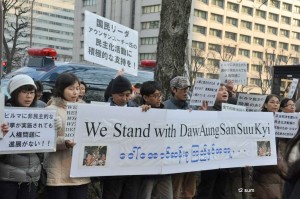Posts Tagged ‘Parliament’ (44 found)
100 Days of Parliament: Many Promises, Little Changes
The first 100 days of a new Parliament can be a defining moment for a burgeoning democracy, with respect for democratic principles, openness and transparency forming the foundation of a successful democratic government. 11 May 2011 saw the first 100 days of Parliament in Burma, but the new nominally civilian government had little to show for itself.
Burma’s Parliament represents a degree of structural change, but due to measures imposed on non-military backed MPs, these MPs have been restricted from performing their responsibilities. They have faced mounting challenges in parliament, with the Speakers in both the National and People’s Assembly blocking 87% of proposals submitted, most notably a proposal concerning national reconciliation. Laws enacted in November have granted MPs freedom of speech, providing their words do not endanger national security or the unity of the country; questions put forward by MPs must not affect international relations or undermine the “interests” of the State and its citizens […]
• • •Burma’s 100 Days of Parliament: More ‘NAYS’ than ‘YEAS’
Australia’s Foreign Minister, MPs, senior government officials, and foreign diplomats were today warned that Burma’s political, economic, and humanitarian crises persisted despite the convening of the Parliament. A video message from Burmese pro-democracy leader Daw Aung San Suu Kyi and statements from a leading ASEAN […]
• • •“100 days of Parliament of Myanmar”, MP Eva Sundari
AIPMC President and Indonesian Member of Parliament, Ms. Eva Kusuma Sundari is in Canberra today to accept the invitation of Burma Campaign Australia (BCA) together with Australian Parliamentarians for Democracy in Burma (APDB) to participate in a half day seminar on 100 days of Myanmar’s Parliament, May 12, 2011 at Parliament Building, Canberra, Australia […]
• • •100 Days of Burma’s Parliament: Strengthening the Status Quo
The 11th of May marks one hundred days since the convening of Burma’s Parliament on 31 January. The laws governing the proceedings of the first parliamentary session in 22 years gagged MPs and restrict civilian access to the Parliament. Many MPs complained about being subjected to detention-like living conditions. The regime also barred domestic journalists and foreign correspondents from covering the session […]
• • •Burma Briefing No. 11: Burma’s New Constitution – Denying Ethnic Rights
This briefing looks at the wide-ranging negative impacts Burma’s new Constitution will have on ethnic groups in Burma. The Constitution is likely to lead to the continued Burmanisation of ethnic minorities and increased militarisation of ethnic areas, with the subsequent increase of human rights abuses which always follows […]
• • •European Parliamentary Caucus on Burma (EPCB) Statement on Postelections Situation in Burma and the European Policy
The European Parliamentary Caucus on Burma calls on the European Union to recognize that a powerless and rubber stamp Parliament which has been designed by the military dictatorship cannot be a path through which the people of Burma can reach their goal of a democratic and […]
• • •There’s a New Parliament, but the SPDC is Still in Charge
Despite the inauguration of parliament on 31 January 2011, the State Peace and Development Council (SPDC) remains firmly in control of Burma’s political landscape. In the lead up to the official transfer of power, which will reportedly occur on 15 March 2011, current and former SPDC members continue to shape Burma’s political future to ensure the military’s dominant position in all levels of the future government.[…]
• • •The Military Regime Lives on in the New Parliaments
On 31 January 2011, Burma’s parliament began its inaugural session, allegedly ending decades of military dictatorship. However, as the first week has shown, the military regime is still alive and well in the new Union Solidarity and Development Party (USDP) controlled government. This parliament is not a step in a slow transition to democracy. It is simply a new phase of the same old military rule […]
• • •ျပည္ေထာင္စုအစိုးရအဖြဲ႕ ဥပေဒသစ္ စစ္တမ္း
နိဒါန္း
မၾကာခင္က ထုတ္ျပန္တဲ့ ျပည္ေထာင္စုအစိုးရအဖြဲ႕ ဥပေဒဟာ ႏုိင္ငံေတာ္ သမၼတရဲ႕ လုပ္ပုိင္ခြင့္အေသးစိတ္ကုိ ျပ႒ာန္းထားရုံမက မၾကာခင္ဖြဲ႕စည္းမဲ့ အရပ္သားအစိုးရသစ္ကုိ ဘယ္လုိလုပ္ကုိင္ ဖြဲ႕စည္းရမလဲဆိုတာပါ ၾကိဳးကုိင္လမ္းညႊန္ထားတဲ့ ဥပေဒလဲ ျဖစ္ပါတယ္။ ဒီဥပေဒကုိ ဗိုလ္ခ်ဳပ္မႉးၾကီး သန္းေရႊက ၂၀၁၀ ေအာက္တုိဘာ ၂၁ ရက္ေန႔စြဲနဲ႕ လက္မွတ္ေရးထုိးထားေပမဲ့ လႊတ္ေတာ္မစခင္ကမွ ရန္ကုန္မွာ ေရာင္းခ်ခဲ့တာ ျဖစ္ပါတယ္။
• • •Activists in Japan Protest Against the New Parliament
 In the lead up to the convening of the new parliament in Burma, the Network for Democracy in Burma organized a series of protests calling on the Japanese government not to recognize the parliament that was elected through the regime’s undemocratic elections in November 2010 […]
In the lead up to the convening of the new parliament in Burma, the Network for Democracy in Burma organized a series of protests calling on the Japanese government not to recognize the parliament that was elected through the regime’s undemocratic elections in November 2010 […]









 All posts
All posts